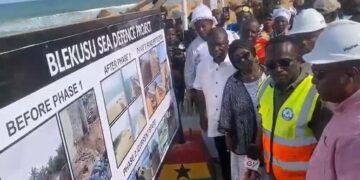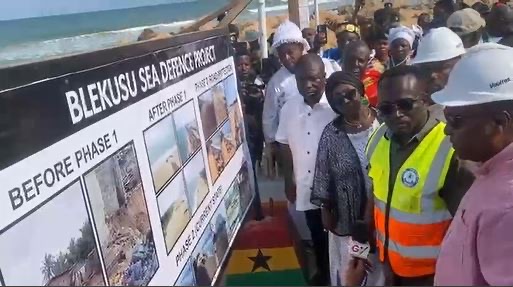By Bridget Mensah, an indigene of Blekusu
There’s something deeply unsettling about watching your heritage disappear into the ocean while politicians play games with your survival. As someone whose roots run deep in the sandy soils of Blekusu, I’ve witnessed firsthand how extreme party politics can literally wash away communities and how the same political machinery can sometimes be our only lifeline.
I still remember the first time I saw my hometown on television. Not for our beautiful beaches, our thriving fishing culture, or the melodic songs that echo from our shores at dawn. No, Blekusu made the news because tidal waves had devoured everything we held dear. There was my grandmother on GTV, standing where her house once stood in Kedzi, lamenting all she had lost to the hungry sea.
The ocean that once gave us life providing fish from our nets and salt from our lagoons had turned into a merciless destroyer. Entire neighbourhoods vanished overnight. Families who had lived by the sea for generations suddenly found themselves homeless, their livelihoods swept away by the same waters that had sustained their ancestors.
We didn’t lose only our properties. We lost our identity. Our fishing boats, our traditional smoking ovens, the beaches where children learned to swim and elders told stories all claimed by relentless tidal waves. The Keta Lagoon, once our source of aquaculture and salt mining, became a reminder of what we were losing rather than what we could gain.
Here’s where the story gets ugly, and frankly, infuriating.
When the NDC government initiated the Blekusu Sea Defence Project in 2015, completing the first phase with 4.6 kilometers of protection, there was hope. Real, tangible progress. Communities that had been living in fear could finally sleep without worrying whether they’d wake up to find their homes underwater.
But then came the change in government, and with it, a shocking display of political heartlessness that still makes my blood boil.
While tidal waves have been ravaging the Keta coastline for decades, 2021 was particularly devastating. The damage that year was enormous, disrupting major economic activities and affecting women, children, and other vulnerable people across communities including Abutiakope, Kedzikope, Keta Central, Tsalakope, Agavedzi, Amuchinu, and Adina. About 1,027 individuals and 500 homes were reported affected by the waves in November 2021 alone, following similar incidents in March that had displaced many residents and destroyed fishing equipment, livestock, and other valuables.
In response to mounting calls for urgent government intervention and NDC MPs’ demands for budgetary allocation for a sea defense wall project, Hon. Matthew Opoku Prempeh, then Energy Minister and high-ranking NPP member who would later become running mate to their presidential candidate Dr. Mahamudu Bawumia, made a shocking statement that still makes my blood boil.
Speaking on a political talk show in December 2021, NAPO dismissed the NDC’s demands as “politically motivated” because the affected areas were in the party’s stronghold. But more infuriatingly, he threatened to lead demonstrations if the Blekusu / Keta tidal waves project was included in the 2022 budget, demanding that his own Ashanti Region’s flooding problems be addressed first.
“The NDC cannot come and put pressure on government to make an allocation in the budget on the project just because the place is their stronghold,” he declared. “If that were to happen, then anybody or myself could also lead a protest and a demonstration asking for government to also cater for the flooding problems in Kumasi in the national budget. Kumasi has flooded four times, but I didn’t see the problem addressed in the budget.”
Read that again. A senior politician threatened to organize protests against helping communities whose homes were literally being swallowed by the sea, dismissing their suffering as mere political theater while our people watched their ancestral lands disappear.
For eight long years, we were abandoned. Not because there wasn’t a solution. Not because it wasn’t technically feasible. But because helping us didn’t align with their political calculations. While families in Blekusu, Agavedzi, Salakope, Amutinu, Adina among others watched their ancestral lands disappear, political leaders played games with our survival.
There’s a bitter irony in how we refer to certain political strongholds as “world banks” areas where parties can always count on votes. Ketu South has been such a place for the NDC, a constituency that has consistently supported the party through thick and thin.
But here’s the thing about loyalty in politics; it shouldn’t be a prerequisite for basic government services. Whether you vote red, blue, green, or rainbow shouldn’t determine whether your government protects you from natural disasters. Yet this is exactly what happened to us.
The NPP government’s neglect of our coastal communities wasn’t administrative oversight, it was calculated abandonment. When you have a senior party figure actively opposing help for drowning communities, you know this goes beyond policy differences. This was about teaching “opposition strongholds” a lesson about the consequences of not voting “correctly.”
Prof. Kofi Awoonor’s haunting poem “The Sea Eats the Land at Home” captures our experience:
“At home the sea is in the town,
Running in and out of the cooking places,
Collecting the firewood from the hearths
And sending it back at night;
The sea eats the land at home.”
But Prof. Awoonor was writing about natural disaster. What we experienced was something more sinister political disaster compounding natural catastrophe. The sea ate our land, but politics ate our hope.
When your grandmother has to relocate not once but twice because of tidal waves, when your family’s fishing business that sustained generations gets washed away, when children can no longer play on beaches that no longer exist, that’s trauma. When you realize this suffering could have been prevented or minimized, but wasn’t because of political calculations it is injustice.
Now President Mahama has returned, and suddenly our coastal protection project matters again. On July 19, 2025, he cut the sod for Phase II of the Blekusu Coastal Protection project, promising to fulfill commitments that were abandoned for nearly a decade.
Some might cynically call this political theater timing announcements to benefit electoral prospects. And yes, there’s definitely political calculation involved. But here’s the uncomfortable truth, sometimes political theater is exactly what desperate communities like Blekusu need.
The NDC knows Ketu South is their stronghold, their “world bank.” Protecting us makes political sense for them. But at least it makes sense to someone. At least someone is calculating that our survival is worth the investment.
This situation raises uncomfortable questions about our democratic system. Why should communities have to depend on their electoral loyalty to receive basic protection from natural disasters? Why should a change in government mean abandonment for some regions while others receive continued investment?
The Akufo-Addo administration spent billions on various infrastructure projects across the country. Roads were built, schools were constructed, hospitals were established. But when it came to preventing entire coastal communities from disappearing into the ocean, suddenly there was no money, no priority, no urgency.
What message does this send to Ghanaians? That your citizenship is conditional? That your right to government protection depends on how you vote? That natural disasters become political weapons?
So here we are, celebrating that the same political system that nearly cost us our heritage might now be our saving grace. It’s a strange position to be in grateful for partisan politics because at least one party sees electoral value in our survival.
President Mahama’s words at the sod-cutting ceremony ring true, “This occasion is not just symbolic. It is a clear demonstration of what leadership can achieve when it listens, when it cares, and when it takes action.” But the unspoken truth is that this caring is selective, tied to electoral mathematics and partisan considerations.
The real tragedy is not only that we nearly lost our homes and heritage to the sea, but it’s that we nearly lost them to politics. In a truly functional democracy, protecting citizens from natural disasters shouldn’t be a partisan issue. Coastal protection, flood management, drought mitigation these should be national priorities that transcend political affiliations.
The Blekusu story is ultimately about the weaponization of government services. It’s about how extreme partisanship can literally wash away communities. But it’s also about resilience, how communities survive not just natural disasters, but political abandonment.
As we celebrate the resumption of our coastal protection project, we must also commit to ensuring that no other community faces what we’ve endured. Natural disasters are unpredictable, but political disasters are choices. We can choose better.
The sea will always be powerful, but politics doesn’t have to be heartless. The question is: will we learn this lesson, or will other communities have to watch their heritage disappear while politicians play games with their survival?
Our ancestors built their lives by the sea because it gave them sustenance. We shouldn’t have to choose between our heritage and our survival because of political calculations. The sea eats the land at home, but politics doesn’t have to help it feast.
















